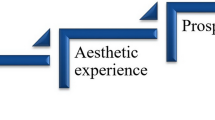Abstract
Art galleries are increasingly asked to provide evidence of their efforts towards facilitating visitors’ learning experience. Augmented reality (AR) and wearable computing has the potential to create a realistic learning environment. Using Google Glass allows art gallery visitors to receive augmented information while looking at paintings. The Generic Learning Outcomes (GLO) framework was specifically designed to investigate visitors’ learning experience in museums and art galleries however, research on art galleries visitors’ learning experience through wearable computing and AR applications is scarce. This study aims to assess how Google Glass enhances visitors’ learning outcomes within the art gallery environment. Twenty-two visitors participated in a test of the Google Glass Museum Zoom application. Visitors were interviewed and the data were analysed using thematic analysis and revealed that Google Glass helps visitors to see connections and enhance the knowledge and understanding of paintings.
Access this chapter
Tax calculation will be finalised at checkout
Purchases are for personal use only
Similar content being viewed by others
References
Amosford, J. (2007). Assessing generic learning outcomes in public lending libraries. Performance Measurement and Metrics, 8(2), 127–136.
Boyatzis, R. E. (1998). Thematic analysis and code development: Transforming qualitative information. Thousand Oaks: Sage.
Brophy, P., & Butters, G. (2007). Creating a research agenda for local libraries, archives and museums across Europe. New Review of Information Networking, 13(1), 3–21.
Chang, K., Chang, C., Hou, H., Sung, Y., Chao, H., & Lee, C. (2014). Development and behavioral pattern analysis of a mobile guide system with augmented reality for painting appreciation instruction in an art museum. Computers & Education, 71, 185–197.
Falk, J., & Dierking, L. D. (2000). Learning from museums: Visitor experiences and the making of meaning. Walnut Creek, CA: AltaMira.
Falk, J., & Storksdieck, M. (2005). Using the contextual model of learning to understand visitor learning from a science center exhibition. Science Education, 89(5), 744–778.
Hoellerer, T., & Feiner, S. (2004). Mobile Augmented Reality. In H. Karimi & A. Hammad (Eds.), Telegeoinformatics: Location-based computing and services (pp. 221–226). Boca Raton, FL: Taylor and Francis, CRC Press.
Hooper-Greenhill, E., Dodd, J., Moussori, T., Jones, C., Pickford, C. (2003). Measuring the outcomes and impact of learning in museums, archives and libraries (pp. 1–24). Research centre for Museum and Galleries, University of Leicester.
Huang, Y. P., Wang, S. S., & Sandnes, F. E. (2011). RFID-based guide gives museum visitors more freedom. IT Professional, 13(2), 25–29.
Kahn, P. (2013, July). Wear them, forget them. Scientific American Online, 12–12.
Leue, M.C., Han, D., & Jung, T. (2014, June 26–29). Google glass creative tourism experience: A case study of Manchester art gallery. Paper presented at WHTF, Seoul.
Lonsdale, P., Baber, C., Sharples, M., Byrne, W., Arvanitis, T., & Brundell, P. (2005). Context awareness for MOBIlearn: Creating an engaging learning experience in an art museum. In J. Attewell & C. Savill-Smith (Eds.), Mobile learning anytime everywhere (pp. 115–119). London: Learning and Skills Development Agency.
Lucero, A., Lyons, K., Vetek, A., Järvenpää, T., White, S., & Salmimaa, M. (2013, April). Exploring the interaction design space for interactive glasses (pp. 1341–1347). Paper presented at CHI, Paris, France.
Mann, S. (2013). Wearable Computing. In M. Soegaard & R. Dam (Eds.), The encyclopedia of human-computer interaction (2nd ed.). Aarhus, Denmark: The interaction design foundation.
Monaco, P., & Moussouri, T. (2009). A conversation about intended learning outcomes. Curator, 52(4), 317–326.
Packer, J., & Ballantyne, R. (2002). Motivational factors and the visitor experience: A comparison of three sites. Curator, 45(3), 183–198.
Rhodes, T., & Allen, S. (2014). Through the looking glass: How Google glass will change the performing arts. Arts Management and Technology Laboratory, 1–12.
Schauble, L., Leinhardt, G., & Martin, L. (1997). A framework for organizing a cumulative research agenda in informal learning contexts. Journal of Museum Education, 22(2&3), 3–8.
Wojciechowski, R., & Cellary, W. (2013). Evaluation of learners’ attitude toward learning in Aries augmented reality environments. Computers & Education, 68, 1–16.
Wood, S., & Hoeffler, S. (2013). Looking innovative: Exploring the role of impression management in high-tech product adoption and use. Journal of Product Innovation Management, 30, 1254–1270.
Acknowledgements
This research has been supported by Knowledge Exchange Innovation Fund, funded by Manchester Metropolitan University (M-80024.8.6). Authors would like to give thanks to Manchester Art Gallery and 33 Labs for their co-operation for this project.
Author information
Authors and Affiliations
Corresponding author
Editor information
Editors and Affiliations
Rights and permissions
Copyright information
© 2015 Springer International Publishing Switzerland
About this paper
Cite this paper
Leue, M.C., Jung, T., tom Dieck, D. (2015). Google Glass Augmented Reality: Generic Learning Outcomes for Art Galleries. In: Tussyadiah, I., Inversini, A. (eds) Information and Communication Technologies in Tourism 2015. Springer, Cham. https://doi.org/10.1007/978-3-319-14343-9_34
Download citation
DOI: https://doi.org/10.1007/978-3-319-14343-9_34
Published:
Publisher Name: Springer, Cham
Print ISBN: 978-3-319-14342-2
Online ISBN: 978-3-319-14343-9
eBook Packages: Business and EconomicsBusiness and Management (R0)




